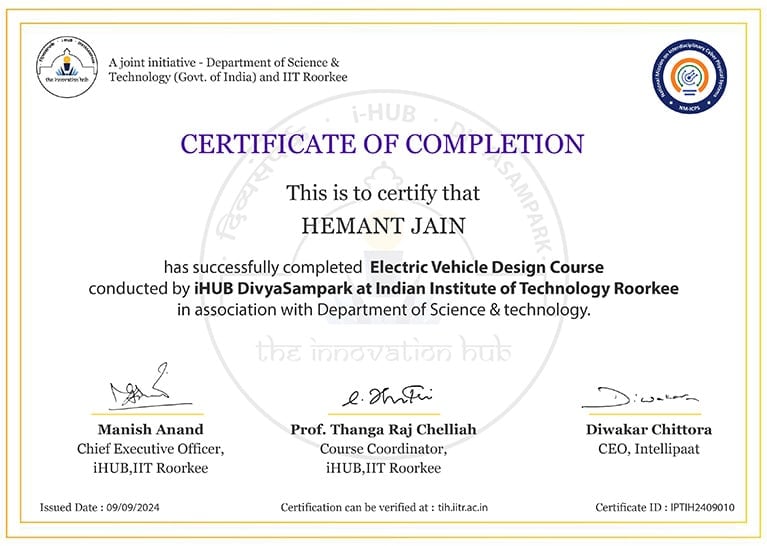Your cart is currently empty.






This comprehensive and top-rated Electric Vehicle Design & Analysis Course in Navi Mumbai by iHUB, IIT Roorkee will make you an expert in concepts like EV powertrain architecture, battery optimization, cell balancing techniques, designing of R-C Model, etc. With the aid of industry-relevant projects and multiple case studies, you will become an expert in the EV domain, under the guidance of industry experts.

Watch
Course PreviewElectric vehicle design course in Navi Mumbai will help you build a strong skill set and have an in-depth understanding of the processes involved in EV PowerTrain Architecture, Battery Optimization, and Cell Balancing Techniques.
Acquire skills in the following concepts after completing this electric vehicle design course in Navi Mumbai:
Following are some of the prerequisites for taking up this Electric Vehicle Course in Navi Mumbai
We have listed a few reasons to consider while enrolling in this electric vehicle design training in Navi Mumbai:
There are several key benefits of electric vehicles compared to internal combustion engine vehicles. After completing this electric vehicle design course, one will be able to comprehend these benefits better. These advantages explain why electric vehicles are gaining popularity and why more and more people are adopting them. Here are some of the key benefits of electric vehicles.
| Type of Power Converter | Description | Function in Electric Vehicles |
| Battery Charger | Converts AC power from charging stations or home outlets into DC power to charge the vehicle’s battery | Enables the recharging of the EV’s battery pack from external power sources |
| Inverter (Motor Controller) | Converts DC power from the battery into AC power to drive the electric motor(s) | Controls the speed and direction of the electric motor, providing propulsion to the vehicle |
| DC-DC Converter | Adjusts the voltage level within the vehicle’s electrical system, typically stepping down high-voltage DC power from the battery to lower-voltage DC power for vehicle accessories and auxiliary systems | Ensures that various vehicle systems receive the appropriate voltage levels for operation |
| Onboard Charger (OBC) | Converts AC power from an external source, such as a charging station, into DC power at a voltage suitable for the vehicle’s battery | Facilitates fast and efficient charging from external power sources |
Talk To Us
We are happy to help you 24/7
60% Average Salary Hike
50 LPA Highest Salary
11000+ Career Transitions
300+ Hiring Partners
Career Transition Handbook
*Past record is no guarantee of future job prospects
They work on various chemical compositions to improve battery output, efficiency and safety.
They develop algorithms for battery management systems and IoT modules that deliver real-time EV operational data.
They work on motors and batteries to ensure they are within optimal thermal and operational ranges.
They ensure the driver circuits, wiring systems and data transfer mechanisms are always fine-tuned.
They focus on performance and improving the electric drive system.
Creates & plan the necessary infrastructure for charging and collaborate with governments and other stakeholders.
Vehicle Fundamentals
Battery Technology
Battery Sizing
Battery Management System (BMS) Development
MATLAB Simulink
Mechanical sub-systems
Charging Infrastructure
Low-voltage Systems
Testing of EVs
MATLAB Programming
MATLAB Plotting Functions
Debugging Tools
MATLAB ODE Function
Simulink Library Browser
MATLAB for EV Simulation
EMI Starts at
₹5,899
We partnered with financing companies to provide competitive finance options at 0% interest rate with no hidden costs
Financing Partners
![]()
Contact Us
Electric Vehicle Projects
iHUB DivyaSampark aims to enable an innovative ecosystem in new age technologies like AI, ML, drones, robots, and data analytics (often called CPS technologies) and become the source for the next generation of digital technologies, products, and services by promoting, and enhancing core competencies, capacity building, and manpower training to provide solutions for national strategic sectors and becoming a key contributor to Digital India. iHUB DivyaSampark a section 8 company (non-government organization) is a Technology Innovation Hub, at IIT Roorkee and was set up under the National Mission on Interdisciplinary Cyber-Physical Systems (NM-ICPS), initiated by the Department of Science and Technology (DST), to build innovative solutions, train manpower, and encourage entrepreneurship for the world’s current challenges like affordable health care, Industry 4.0, and sustainable smart cities.
On successful completion of this electric vehicle design training in Navi Mumbai, along with the given projects and assignments, and scoring a minimum of 60 percent in the certification examination, you will be rewarded with the advanced certification in electric vehicle design by iHUB, IIT Roorkee and Intellipaat.
In the past decade, the electric vehicle market has experienced enormous growth, and this is expected to continue. Hence, the popularity of electric vehicle design skills has been increasing and a majority of companies consider electric vehicle design certification to be a must-have for their employees.
This electric vehicle design certification in Navi Mumbai will equip you with all the electric vehicle design methodologies and principles that will help you develop a rewarding career in this domain.
Yes. Intellipaat’s electric vehicle design training certification is recognized by around 400+ companies globally. Our alumni are placed in top companies and many of them have confidently started their careers in this domain.
Our Alumni are working in Top EV Companies
Electric vehicle design involves creating electric-powered vehicles that do not rely on combustion engines fueled by fossil fuels. It encompasses various aspects such as range estimation, battery optimization, and design analysis. Our electric vehicle design certification courses in Navi Mumbai are comprehensive, covering all these elements to help you become a certified EV designer.
Research indicates that the EV industry is generating numerous job opportunities as the world approaches an EV transition. The automotive sector is currently shifting from traditional cars to electric ones, with projections suggesting a significant transformation by 2025. By then, electric vehicles are forecasted to capture 23% of the market share, up from 3% today. To be a part of this future change, consider enrolling in our electric vehicle design course in Navi Mumbai.
The average base pay for electric vehicle design professionals stands at INR 5,00,000 p.a., for entry-level positions. This can go as high as INR 25,00,000 p.a.
Some of the major companies hiring electric vehicle design engineers are Maruti Suzuki, Ather, Piaggio and Simulation Lab, etc.
The job opportunity for designing electric vehicles presents a significant challenge without practical experience. If you are new to the field of electric vehicle design, acquiring some basic-level experience or certification to demonstrate your ability is essential. Therefore, we recommend obtaining electric vehicle design certification in Navi Mumbai to kick-start your career in this field.
No, it is absolutely possible to start a career in Electric Vehicle Design without a degree.
Mumbai, the “City of Dreams,” is India’s beating heart of finance and entertainment, nestled along the Arabian Sea. This island metropolis, connected to the mainland by bridges and causeways, pulsates with diverse cultures, vibrant nightlife, and the iconic Bollywood film industry.
The tropical climate offers distinct seasons: a monsoon season with heavy rain, mild winters, and hot, humid summers.
Mumbai’s unique charm lies in the modern skyscrapers, showcasing a captivating fusion of tradition and progress.
The major attractions of the city include




 Click to Zoom
Click to Zoom